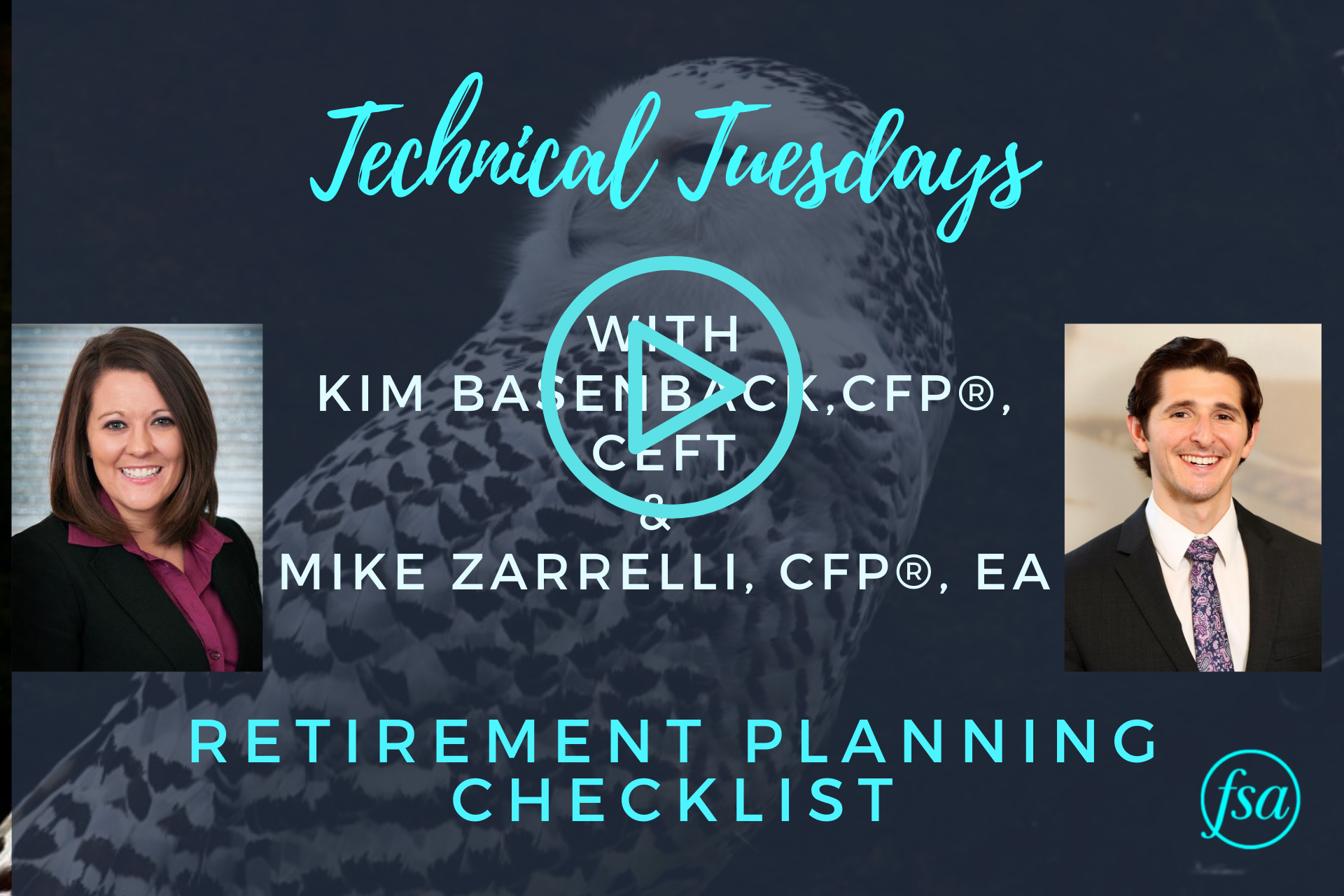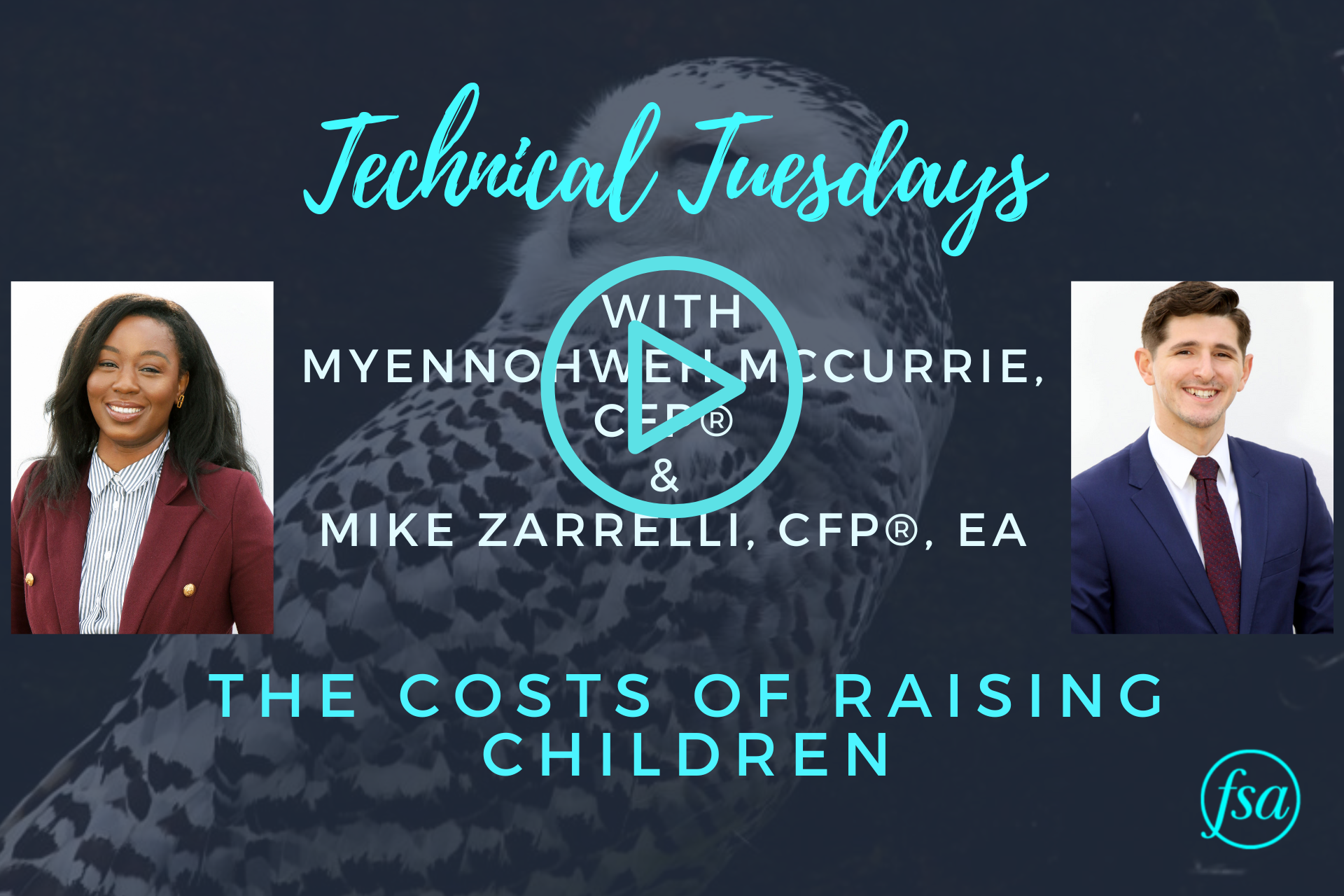Kim Basenback, CPF®, CeFT, and Mike Zarrelli, CFP®, EA, share some analogies to consider when managing personal finances.
Analogies to Simplify the Complex Transcript
Mike:
Hey, everyone. Welcome to our first Technical Tuesdays of 2024. I’m Mike Zarrelli.
Kim:
And I’m Kim Basenback.
Mike:
And today we’ve got a special episode for you all where we talk about some analogies that’ll simplify the complexities of finances. So with that, let’s dive right in. Kim, what’s the first one?
Kim:
Yeah, let’s talk about delaying investing. So, waiting to start investing is like delaying when you leave to get to an appointment on time. If your destination is 60 miles away and you leave an hour before you need to be there, then you’ve got to drive 60 miles an hour to get there on time, and that may work fine. But let’s say instead you wait and leave 20 minutes later, so now you’ve got 40 minutes to get to your appointment. You’re going to be forced to drive at a much higher speed, most likely getting a ticket, to get to your appointment on time. The same is true for investing. Compound interest, earning interest on top of interest, is the best thing when it comes to investing. As your portfolio continues to grow, the interest you’ve earned then earns interest on top of that, so the dollar gets larger and larger.
To illustrate this, there’s a chart on your screen, and this is from JP Morgan, and we want to highlight the blue line, as well as the purple line. So the blue line is an investor that started at age 25, saving every single month until age 65. The purple line is someone that waited and started 10 years later, so at 35, they’re saving the same amount every single month out to age 65. You can see the difference in the end at age 65 between how much they each have; it’s drastic. So starting as early as possible is key.
Mike:
Yeah, absolutely. The number one thing to help with compound interest is adding the extra time. So, it’s crucial to start investing today. It doesn’t matter how much money, it’ll help in the long run. The saying is that the best time to start investing was yesterday, and the next best time is right now.
Our next analogy is about performance chasing, and we’ve all been there, I know we have. When you’re stuck in traffic, and you’re in the slow lane, and the lane right next to you is going a lot faster. And you just can’t help fighting the urge to get into that faster lane to get to your destination a little bit faster. And what happens when you move to that new lane? It slows right down. And then to make it even more frustrating, the slow lane you were in somehow starts to speed up.
And unfortunately, the same is true with investments. Whether it’s social media or the news, some stocks or different asset classes get hyped up because they’re on a hot short-term performance. And, fear of missing out, or FOMO, sets in, and people just sell their original investment plan to hop onto that trend. What happens shortly after? The investments start to fizzle out, and it ends up poorly. We’ve seen at time and time again whether it was 2001 or 2008 or the tech companies in 2021. So, I know it’s hard, but fight the urge to have FOMO and jump onto the new hot stock trends.
Kim:
Yeah, Mike, that’s a great example. I know I can admit I’ve been guilty of changing lanes in traffic, hoping to speed things along, only to end up dead stopped while the lane next to me is flying by. And that’s true, and we encourage you guys, don’t be tempted to abandon what you own just to chase the newest pick. It might not be as fun, but staying in your lane or sticking to the investment plan will help you reach your destination on time.
The next example or analogy we want to give you is related to market news. What would you guys do if you walked into an elevator and the only two options were plunge or soar? And I imagine you would jump right off that elevator because it’s not saying the normal up and down. And news companies know this, and even though those are just words, they’re trying to get eyeballs on their content and can often use words that incite emotions of fear or euphoria to increase viewership. Keep that in mind when you’re reading the newspaper, browsing the internet, watching the news. Words are just words and can easily be manipulated to stress a viewpoint.
Mike:
Yeah, totally agree with that point. Now, there’s no problem with watching the news or CNBC, but it’s definitely important to take it with a grain of salt. Sometimes it’s hard to decipher what is noise and what’s something you need to actually pay attention to, and that’s why your financial advisor is here. We’re here to help you determine what’s important, what do you need to pay attention to, and what can you just shift out of your attention.
So our last analogy is going to be about retirement planning. And as you may know, when we’re doing retirement planning, we’re projecting out 20, 30, 40 years. So we do need to make some assumptions, and this analogy speaks to that really well. It’s about taking a trip from DC to LA. So a cross-country trip. And, what’ll happen is when you’re in DC and you plug in the directions on Google Maps, it’s going to give you a very, very ballpark ETA. And it’s going to vary on what your actual ETA will be. And, what will happen is as you get closer to California, that ETA is going to become much more accurate and spot on. The same is true with retirement planning. When you’re 20 years out from retirement, it’s going to be a lot of assumptions because we don’t know what you’re spending or lifestyle is going to be like when you get to that retirement date. So that’s why we like to update plans pretty often, so we can get more accurate each time we run it.
Kim:
Yeah, as Mike said, the closer you get to retirement, the more precise we can be with the numerous variables, such as your expenses, what other goals you may have in retirement. Just know that we’re here to help set the plan and also course correct as things change in life.
Mike:
Absolutely. Well, that wraps up this video. We like keeping these analogies in our back pocket just when the inevitable complexities of finance comes. If you have any questions or want to share your own analogies, reach out to your financial advisor. Love to hear it, and we’ll see you in the next video. Thanks.
Kim:
Thanks.
FSA’s current written Disclosure Brochure and Privacy Notice discussing our current advisory services and fees is available at www.FSAinvest.com/disclosures or by calling 301-949-7300.




